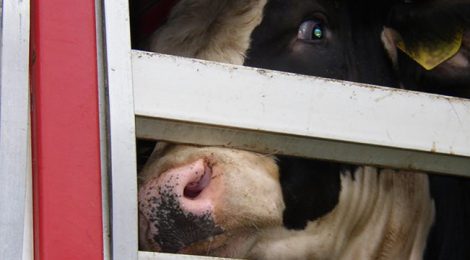
Why We’re Asking You to Complete the NFACC Transport Survey
The National Farm Animal Care Council (NFACC) has been given $4.56 million from the federal government to update its industry codes of practice, starting with the animal transport code. As part of the process, NFACC is asking interested parties to complete its Introductory Survey by March 30th. CETFA will be completing the survey and we urge you to do the same.
The NFACC transport code is separate from the animal transport regulations which were just updated and are legally binding. Unfortunately, the updated animal transport regulations fail animals in nearly every respect. You can read our blog about its many shortcomings here.
The NFACC codes are developed by industry and represent “best practices” but are voluntary and inspections are not conducted for compliance. In many respects, the codes can be seen as simply window dressing, working to artificially prop up consumer confidence in Canadian animal agriculture. Sadly, the majority of producers do not follow the codes and have little to no incentive to do so. In fact, a survey conducted last year showed that less than 25% of cattle producers follow the cattle codes of care.
So, if the codes are so ineffective and unenforceable why is CETFA asking supporters to complete the survey? The answer is simple. We must make sure industry and government know that animal advocates have not been beaten and will continue to raise their voices in defense of animal welfare. If we don’t do it, who will?
Below are our recommendations for responses to NFACC’s survey questions. One overarching ask is that the codes become law so that the reviews are not simply busy work funded by taxpayers. If NFACC is serious about animal welfare — as it claims to be — it should be working with provincial and federal enforcement bodies to have the codes adopted into law. Unfortunately, the animals cannot rely on the newly updated federal transport regulations to protect them, so we must press for NFACC’s codes to do the work the regulations should have.
Click here to participate in NFACC’s Introductory Survey.
Recommended Responses
Driving and Other On-Road Practices (e.g., stoppages on-route, adjusting for environmental conditions)
1. It should be illegal to transport unfit and compromised animals
2. It should be illegal to transport animals above and below specified temperature thresholds
3. Maximum transport time for all species without food, water or a break should be reduced to 8 hours
Loading/Unloading (e.g., ramps, handling)
1. Use of electric prods should be banned for all species
2. Space requirements for all species should be detailed and prescriptive
3. Inspectors should be present during loading and loading to enforce the codes
Care of Animals at Transitional Sites (e.g., assembly points/yards, auctions/sales yards, feed/water rest stations)
1. Inspectors should be on site to enforce the codes
2. Unfit and compromised animals should be euthanized on the trailer and not unloaded
3. Heavily pregnant animals should remain on site and not be reloaded
Vehicles and Equipment (includes containers)
1. All animals, including poultry, should have enough headspace to be able to stand in their natural position
2. All trailers should provide forced ventilation and protection from weather extremes
3. Trailers for large animals should be equipped with species-specific on-board water drinkers
SPECIES-SPECIFIC TOPICS
Cattle (beef, dairy, and veal cattle)
1. Please see general recommendations
Equines (horses, ponies, donkeys, mules)
1. Please see general recommendations
Pigs
1. Please see general recommendations
2. Boars with evidence of bashing should be investigated and legal action taken
Sheep/Goats
1. Please see general recommendations
Bison/Deer
1. Please see general recommendations
Mink/Fox
1. Please see general recommendations
Rabbits
1. Please see general recommendations
Poultry: Meat Birds (chickens, turkeys, breeders)
1. Please see general recommendations
Poultry: Pullets and Laying Hens
1. Please see general recommendations
We welcome any additional comments or suggestions that you feel should be considered in developing the transportation Code.
NFACC should work with provincial and federal enforcement bodies to have the codes adopted into law.


